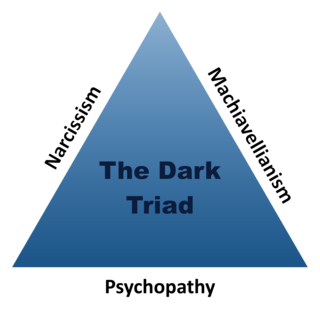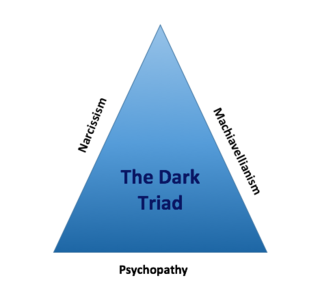 W
WMachiavellianism as a concept, or "popular discourse", in political history is a term for the political philosophy of the Italian Renaissance diplomat Niccolò Machiavelli. Machiavellian ideology is often depicted "as godless, scheming and self-interested". In discussions of Machiavelli's thought "Machiavellian" and "Machiavellianism" are often used in reasoned critiques, also in general usage the terms more often occur in political polemic, suggesting an unprincipled lust for power, achieved through "subtle policie, cunning roguerie", by the "Machiavel", an adherent of these principles. In this idea, as described by Isaiah Berlin, Machiavelli was regarded as "a man inspired by the Devil to lead good men to their doom, the great subverter, the teacher of evil, le docteur de la scélératesse, the inspirer of St. Bartholomew’s Eve, the original of Iago".
 W
WIn psychology, the dark triad comprises the personality traits of narcissism, Machiavellianism, and psychopathy. They are called "dark" because of their malevolent qualities.
 W
WThe Dark Triad Dirty Dozen (DTDD) is a brief 12-item personality inventory that simultaneously assesses the three socially maladaptive, dark triad traits: Machiavellianism, narcissism, and psychopathy. It was developed by Jonason and Webster in 2010 based on already existing, longer measures of each dark triad trait.
 W
WDivide and rule, or divide and conquer, in politics and sociology is gaining and maintaining power by breaking up larger concentrations of power into pieces that individually have less power than the one implementing the strategy.
 W
WIn the field of personality psychology, Machiavellianism is a personality trait centered on manipulativeness, callousness, and indifference to morality. Though unrelated to the historical figure or his works, the trait is named after the political philosophy of Niccolò Machiavelli, as psychologists Richard Christie and Florence Geis used edited and truncated statements inspired by his works to study variations in human behaviors. Their Mach IV test, a 20-question, Likert-scale personality survey, became the standard self-assessment tool and scale of the Machiavellianism construct. Those who score high on the scale are more likely to have a high level of deceitfulness and an unempathetic temperament.
 W
WThe Prince is a 16th-century political treatise written by Italian diplomat and political theorist Niccolò Machiavelli as an instruction guide for new princes and royals. The general theme of The Prince is of accepting that the aims of princes – such as glory and survival – can justify the use of immoral means to achieve those ends.
 W
WThe Art of War is a treatise by the Italian Renaissance political philosopher and historian Niccolò Machiavelli.
 W
WVirtù is a concept theorized by Niccolò Machiavelli, centered on the martial spirit and ability of a population or leader, but also encompassing a broader collection of traits necessary for maintenance of the state and "the achievement of great things."